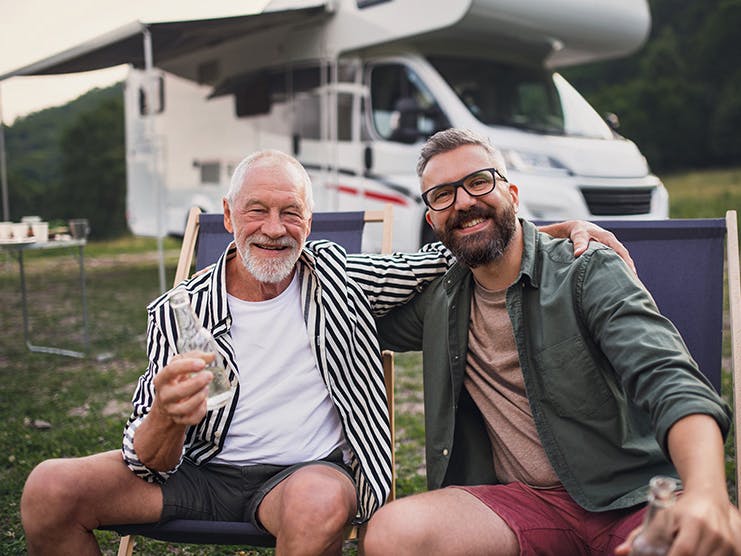
Spending time in nature is good for the body and the soul, so grab the marshmallows, pick a site, and go camping!
The word camping probably evokes a lot of fun memories: sitting around bonfires roasting marshmallows as a Scout, or fishing expeditions with your kids when they were younger. But camping is still something you can do into your 60s, 70s, or even beyond, with friends, your significant other, or your grandkids.
Always popular, camping’s recently become even more of an attractive vacation option, due to the COVID-19 pandemic. About one in five campers in the Silent generation, and about one in ten of all Baby Boomers, reported that they took up camping again in 2020 because of the COVID-19 pandemic, according to the 2021 North American Camping Report.
Camping itself covers a wide range of experiences. Whether you plan to pitch a tent, use an RV, or go glamping for a more luxury experience, there’s definitely a camping option that’s right for you.
The benefits of camping
There are a bevy of physical and mental health benefits associated with camping. Here are some reasons to consider it:
You’ll strengthen family traditions.
Did you camp with your parents and then later with your children? Some families have been camping in national parks for over a century. This is a great activity to pass on from generation to generation. You’ll instill in your grandkids an appreciation for time outdoors and spend some quality non-screen time together.
You’ll connect with nature.
Whether you pitch a tent on a secluded island or park your RV at a campground, you’ll reap the benefits of the great outdoors. In fact, spending time in green spaces like parks and forests has been linked to a slew of benefits, such as:
- Improved attention
- Lower stress
- Better mood
- Reduced risk of mental health disorders like anxiety and depression
- More empathy and cooperation
In addition, sleeping under the stars has been shown to help regulate your body’s natural circadian rhythms, which can help you get better quality Zs, too.
It keeps you active.
Just the very act of pitching a tent is sweat-inducing. Even if you’re glamping, chances are good that you’re participating in activities such as fishing, canoeing, hiking, biking, and swimming. All of these are much better for your heart, lungs, brain, and waistline than just lying on the beach sipping pina coladas (although there’s a time and place for that, too!).
Camping doesn’t just build physical skills, either. All the little things that you need to do every day–purify water, build a fire, catch your dinner–teach you life skills that you can use at any age. They’ll also build confidence and self-worth.
It strengthens relationships.
When you travel beyond a 5G area, you’re forced to interact face-to-face with your companions, rather than your phone. You can share stories under the stars or just enjoy some moments of quiet together. These shared experiences will create memories that will keep your relationships going strong for years.
It also allows you to spend some time just getting to know yourself. If you’re away from the hustle and bustle of your regular day-to-day life, you can take a few minutes to sketch in a notepad or write in your journal.
How to get started
If you’re hesitant to go camping, it’s understandable: after all, the last time you may have gone was 20-plus years ago, when you were in better shape and your back was more forgiving about sleeping on the cold, hard ground. The good news is that “roughing it” today is much easier. Camping gear is much faster to assemble, and you can even make your campsite in the back of your SUV.
Here are some ways to make your camping experience–whether it’s your first time, or your first time in 30-some years–a breeze:
Stick to campgrounds.
State and national parks may be gorgeous, but they don’t offer camp stores, camp staff, and clean bathrooms, all of which can be handy for novices. One good option is a KOA-type campground, which can be found throughout the country. Besides basic tent camping, some sites also offer more unique options such as teepees, tree houses, airstreams, and yes, even yurts. You can find a campground near you here. Just make sure that you book in advance: As camping has surged in popularity, it’s become harder to find places that will let you just drop in.
Rent gear first.
If you’re not sure that you’ll stick with camping long term, it’s best to try it out before you spend a lot of money on gear. Companies such as Arrive Outdoors and Xscape Pod will even ship individual equipment or camping kits to your home. Xscape Pod, for example, will rent you a “pod” that contains all the essentials–including a tent, sleeping bags, airpads, chairs, headlamps, a cookset, stove, a cooler, a first aid kit, a fire starter, and a lantern–for two people for just $149.
Prep meals in advance.
If you’re camping over a weekend, for example, plan to bring some frozen single serving leftovers from home that you can defrost over the campfire on Friday evening. You can also do as much kitchen prep work (like cutting veggies) at home, where it’s faster and easier. Quick, painless dinner options include kabobs (marinate your protein and veggies before you leave home), sloppy joes (brown the meat at home beforehand), or the forever camp fave, hamburgers and hot dogs.
Make a checklist.
You don’t want to get to the campsite only to realize that you’ve forgotten bug spray. Websites like LoveTheOutdoors have comprehensive checklists. Some of the most essential items include:
- Tent
- Sleeping bags with pads or air mattresses
- Camp chair
- Ground cloth
- Sunglasses, hat, and sunscreen
- First-aid kit
- Matches
- Water
- No-prep food
- Flashlights
- Insect repellent
Consider glamping.
If you’re curious about camping, but also apprehensive, then glamping, a camping experience that includes more services and amenities, may be for you. Almost 30% of all first-time campers say they started their camping experience in some type of glamping arrangement, according to the North American Camping Report. While they’re pricier, you’ll still get all the benefits of being out in nature. Three good websites to explore:Hipcamp,Glamping Hub, and Glamping.
Check your health insurance.
If you get sick or injured while camping (or glamping), you’ll want to make sure you’re covered. While Original Medicare covers you anywhere in the United States, the rules are different with Medicare Advantage. While all MA plans must cover emergency care in the U.S.A, there’s not a guarantee they’ll cover other forms of care, such as a doctor’s visit. Some plans may cover providers that are out-of-network or out of your service area, but may require higher cost-sharing or prior authorization.
Do you have Medicare questions? We have answers.
When it comes to Medicare, one plan definitely does not fit all. At ClearMatch, it’s our mission to match you to the policy that best serves your unique needs. It’s all we do, and we do it better than anyone. Check out our extensive library of articles for answers to your Medicare questions. Or, compare plans in your area to get started finding the policy that’s right for you.
Additional Resources
Travel During Retirement: Are You Ready to Hit the Road?
Internal Website Link
How Medicare Works When You Travel Internationally
Internal Website Link
Find a Plan
Internal Website Link
“Nurtured by Nature”
External Website Link
“Why Camp?”
External Website Link
“The Physical Benefits of Camping”
External Website Link
“It’s Never Too Late to Become a Camper”
External Website Link


